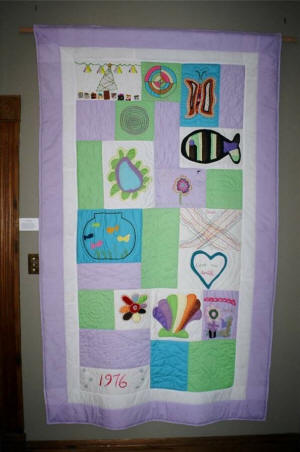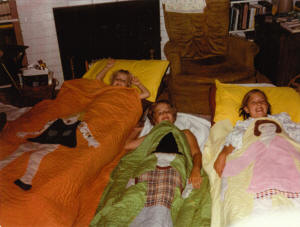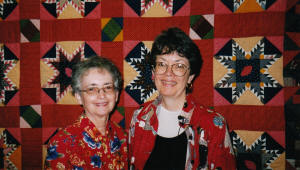|
1) How do you prefer to be described, within the field of textile history?
If you have a business, please tell us
about that.
“Quilt Historian."
(Click to enlarge.)

2) When and where did you begin your serious interest in the history of quilts, textiles or garments?
"The cross fertilization of needlework patterns and textiles across all
cultures has interested me since I lived overseas while in high school
and again while in college. Seeing and observing crafts in some 19
countries before the age of 20 left its mark. I became especially
interested in quilts as a vehicle of family history thanks to my
mother-in-law, Wini Waters Alexander. Wini was very proficient at many forms of needlework
before she took on quilting in the mid-1970s. The first quilt she gave
us was made entirely of our eldest daughter’s art work age 3-8. Wini
interpreted Sarah’s artwork in several different forms of needlework and
incorporated all into a single quilt. I was hooked on quilts from then
 on!
I embraced quilt making, quilt history and genealogical research in 1980
when we moved to Virginia the first time. In Virginia I began to dig
into my paternal roots back to 1740 in the Shenandoah Valley and started
a family history newsletter. In 1981 when I learned about the American
Quilt Study Group I joined immediately." on!
I embraced quilt making, quilt history and genealogical research in 1980
when we moved to Virginia the first time. In Virginia I began to dig
into my paternal roots back to 1740 in the Shenandoah Valley and started
a family history newsletter. In 1981 when I learned about the American
Quilt Study Group I joined immediately."
(Click to enlarge.)
3) What “known” individual (or group) influenced you most and why?
"The American Quilt Study
Group has had the greatest impact on my on-going pursuit of quilt
history. I’ve already told you about my mother-in-law's influence. Truly
without her influence, I may never have gotten specifically into
quilting. My father was also a very powerful influence and example from
childhood on due to his love of handcrafts and people’s stories."
4) Who became your personal mentor as you began your learning?
"AQSG member Erma Kirkpatrick of Chapel Hill, NC, was my first mentor. She
came to lecture and teach at the Richmond Quilt Guild and invited me to
come to Chapel Hill and stay with her and attend the North Carolina
Quilt Symposium. Because of Erma I finally attended my first AQSG
Seminar in 1985. There I met Bets Ramsey, Cuesta Benberry and Barbara
Brackman who eventually became mentors and friends as well.
"Erma then introduced me to the founder of The Quilters Hall of Fame,
Hazel Carter, at the 1995 Smithsonian Conference “What’s American About
American Quilts”. In 1995 I also joined the newly formed Antique Quilt &
Vintage Fabric Dating Club of Northern Virginia founded by Hazel and her
friend Bunnie Jordan. Now my textile studies began in earnest! This was also the same year I joined the
Alliance for American Quilts. In 1996 I was registered to attend the
first Boxes Under the Bed seminar but had to cancel when my daughter’s
only child was born with a severe bi-lateral cleft that required special
care. I spent 7 weeks helping her after his birth. He is one very
special grandchild to me.
studies began in earnest! This was also the same year I joined the
Alliance for American Quilts. In 1996 I was registered to attend the
first Boxes Under the Bed seminar but had to cancel when my daughter’s
only child was born with a severe bi-lateral cleft that required special
care. I spent 7 weeks helping her after his birth. He is one very
special grandchild to me.
(Click to
enlarge.)
"In retrospect, meeting Hazel Carter, the founder of The Quilters Hall
of Fame, (TQHF) was a life-changing event in my life. We only lived 6
miles apart and began to travel together to various quilt history
events. By 1997 I was sharing my conference planning and marketing
skills with TQHF and was finally persuaded to join the Board in 2001.
"In 2004 Hazel invited me to be co-chair of the Grand Opening of TQHF and
to help plan the opening exhibits. After the museum opening, I continued
to interview each new Honoree and write the subsequent article and to
help plan and organize the Honoree exhibits for TQHF thru 2008. I also
served as president of TQHF 2005-2008. So Hazel was ultimately my most
“hands-on” mentor in the quilt world, if you will."
5) What aspect of study were you most passionate about at first? How has this changed over time and why?
"Documenting the quilt
maker’s story captivated me immediately for I had inherited a couple of
quilts from my Great Grandfather Samuel Milton Biedler’s home in the
Shenandoah Valley about the same time I first got into quilting. I set
out to learn all I could about the women of that household.
"In time I also became interested in the history of quilts as carriers
of community history; the history of pattern development and
dissemination; the history of textile production and its impact on the
industrial revolution/economic history of the Western world; and the
history of quilt revivals, but the quilt maker’s story has remained my
most passionate focus."
6) What is your current
“pet project”?
"I would have to say Signature Quilts. Signed quilts and/or
Signature Quilts offer unprecedented opportunity to track down the
in-depth history of an individual or a community.
"In 2004 Lynn Gorges and Nancy Hornback invited Cinda Cawley, Jan Gessin
and I to participate in the drafting of a Signature Quilt documentation
project. Our goal was to share our efforts with the Quilt Index in order
to get feedback so that our project could dovetail with their efforts. In 2006 we five were invited to join the Quilt Index's
Signature Quilt Pilot Project Team, though only three of us were free to
accept at the time, Nancy Hornback, Lynn Gorges and myself. The first
phase of this project was completed in August 2009. The nonprofit Quilt
Index is run in partnership by the Alliance for American Quilts,
Michigan State University Museum and MATRIX - The Center for Humane
Arts, Letters and Social Sciences at MSU.
"I presently (Jan 2011) serve on the board of our local historical
society, am one of four advisors to the newly launched Oregon Quilt
Project and serve on the Quilt Index Signature Quilt Pilot Project
Committee.
"In light of this niche interest, I am one of three quilters who has
initiated a local Signature Quilt Project on the island where I
currently live, which has approximately 2500 year-round residents. Our
goal is to capture the signatures of as many of our residents as
possible as well as their stories about how they heard about Lopez
Island and what living in this very special community means to them."
7) What aspect of your research or contribution to textile studies has satisfied you the most?
"Writing. Lecturing. And being a facilitator -- bringing people together in
the quilt world who 'need to know each other' so that things get done in
this field I am so passionate about! The Internet makes it so much
easier to share our knowledge with others and to connect with others. In
December 2008, while snowed in for a week over Christmas, I created
three quilt history blogs: one for TQHF; one to document the history of
quilting on Lopez Island where I now live; and my own blog — Quilt
History Reports. As a result of starting the TQHF blog, people from over
96 countries have now visited the blog. Another example of facilitation:
In 2004 I was able to assist Georgia Bonesteel and her film
documentarian son, Paul, in the making of the documentary “The Late
Twentieth Century Quilt Revival” by helping them bring people together
and arranging studio space. The documentary was filmed during the TQHF
Grand Opening and began airing on PBS stations in late 2005. In 2009 I
was able to bring Carol Veillon, editor of the French magazine Quilt
Mania, together with Xenia Cord. I had met Carol while on a textile
study tour to Great Britain in 2007 and invited her to come to the
TQHF’s Triple Anniversary. Then I turned her over to Xenia Cord, whom I
had known for many years, when I could not be there myself to host her.
Out of that came a whole series of articles in Quilt Mania about Indiana
quilters because of Xenia's connections. This is all very reminiscent of
the kind of work I used to do in the business world and I love it."
8) Within this arena, what would you like to do, but haven’t done yet?
"Complete a Q-SOS (Quilter's Save Our Stories) project where I
live and become a facilitator to help Washington and Oregon guilds to
start Q-SOS projects.
"I want to fully document all quilts in my collection --- especially my
Signature quilts. I’d also like to start quilting again."
9) Any further comments are invited.
"My history of volunteer work in the quilt world is actually based on
previous work experience in conference planning and/or direct mail
marketing with museums or companies based in Richmond, VA, New Orleans,
Potomac, Maryland, and Reston, Virginia. I have loved history and have
loved to write since I was at least 10 years old. I have been enamored
of textiles ever since living overseas twice as a teenager. I have
loved to organize events since my high school days. All of these streams
seemed to finally converge in my life’s avocation – quilt history.
"In 1980 I took my first quilting class. In 1981 started a newsletter
for the Richmond Quilters Guild, served as Program Chairman, volunteered
at the Valentine Museum and joined the newly formed American Quilt Study
Group. While in Richmond I also co-founded a children’s division of the
Virginia Guild of Needlewomen and served as its first co-director;
taught quilting to children while working at the Richmond Children’s
Museum; and designed and sold my own small quilted pieces through Rocky
Road to Kansas in Old Towne Alexandria.
"While living in Louisiana, I published my first quilt-related article
outside a guild newsletter (Robbie Fanning’s Open Chain); joined the
National Quilting Association; and entered and won the logo design
contest when the Gulf States Quilters Association was formed. This must
have been 1985 or 1986. My suggested newsletter name entry also won
their contest! Both were voted on by all members.
"In 1984 Bonnie Leman wrote in one of her editorials about my efforts to
persuade the National PTA to change its rules so that needlework could
be included in their annual “Reflections” contest. The rules were
successfully changed in 1985 due to the grassroots efforts of several
like myself from within the quilting community but I don’t know if
students ever took advantage of it! I could never persuade either of my
daughters to do any more quilting once we left Virginia!
"I have belonged to a quilt guild wherever I have lived since taking up
quilting. It is the best way in the world to make new friends if you
have to relocate! In 2005 I helped found the Western Washington Quilt
Study Group shortly after moving to the Pacific Northwest and
volunteered to become a Regional AQSG Rep."
10) Please describe (in a list) the contributions you
have made via books, exhibits, presentations, contests, articles, fabric
lines, research papers and the like.
Book Chapters to date:
(1) New hardback version of the TQHF book is coming out in 2012
published by Voyageur Press, an Imprint of Quayside Press, and will
carry three of my updated stories.
(2) “Mary Schafer”, The Honorees of the Quilters Hall of Fame,
Supplement #2-edited by Rosalind W. Perry, published by The Quilters
Hall of Fame June 2008.
(3) Introduction to “Shenandoah Valley Region,” Quilts of Virginia
1607-1899: The Birth of America Through the Eye of a Needle by
Virginia Consortium of Quilters, Barbara Tricarico, Editor and
Photographer, published by Schiffer Books (2006).
(4) My genealogical research “The Biedler Covered Bridge of New Market,
Virginia,” appears in Covered Bridges of Virginia by Leola B.
Pierce, published by Upstream Press (2002).
(5) “Barbara Brackman”, The Honorees of the Quilters Hall of Fame,
edited by Merikay Waldvogel and Rosalind W. Perry, published by The
Quilters Hall of Fame June 2004.
(6) “A Short History of The Quilters Hall of Fame” in Once upon a
Quilt: A Scrapbook of Quilting Past and Present, edited by Margret
Aldrich, published by Voyaguer Press (Oct 2003).
(7) “Stitches in Time”, in Quilts Are Forever: A Patchwork Collection
of Inspirational Stories, edited by Kathy Lamancusa, published by
Simon & Schuster (March 2002).
Articles by Karen B. Alexander
For Alex Anderson and Ricky Tims’ “The
Quilt Show” on-line Quilting Pioneers series:
http://www.thequiltshow.com/os/articles.php/cat_id/3
Jean Wells Keenan, August 24, 2009
Ruby Short McKim, July 27, 2009.
Merikay Waldvogel, June 07, 2009.
Bets Ramsey, May 11, 2009.
William R. Dunton, Mar 29, 2009.
Ruth Finley, Feb 26, 2009.
Florence Peto, Jan 27, 2009.
Pieces of Time: A Quilt and Textile History Magazine by the Iowa
Illinois Quilt Study Group:
“Hazel McDowell Carter: Her Story,” Volume 3, No 1, April 2008.
“Cuesta Benberry: Her Story, Volume 3, No 1, April 2008.
“The Quilt Renaissance of Our Era,” Volume 3, No 1, April 2008.
The Quilters Hall of Fame newsletter:
“Remembering Cuesta Benberry,” No. 32, Fall 2007.
“A Tribute to Mary Schafer,” No. 31, Spring 2007.
“The 25th Anniversary of The Quilters Hall of Fame,” No. 25, Spring
2004.
The Grand Opening of The Quilters Hall of Fame,” No. 24, Fall 2003.
“Meet 2003 Honoree: Georgia Bonesteel,” No. 23, Spring 2003.
“Barbara Brackman’s Creative Career,” No. 20, Fall 2001.
“Brackman’s Induction brings ‘Material Pleasures’,” No. 20, Fall 2001.
“Meet 2001 Honoree: Barbara Brackman,” No. 19, Spring 2001.
“Evidence of Friendship: The Quilt Block Collection of Cuesta Benberry,”
No. 15, Spring 1999.
“Cuesta Benberry’s Gift,” No. 12, Fall 1997.
Blanket Statements, Quarterly News Publication of the American Quilt
Study Group (AQSG):
“Military Signature Quilt,” No. 65, Summer 2001.
“Grand Opening of The Quilters Hall of Fame,” No. 73, Summer 2003.
“Common Threads: Creating a Cloth for Empowerment — An International
Symposium: The Role of Textile Collectives in Women’s Empowerment and
Recent Research on African-American Quilters”, Review of March 1999
symposium organized at the Smithsonian Institution by Roland Freeman.
Blanket Statements (AQSG), Summer 1999.
Other articles:
“2010 Lopez Island Signature Quilt,” The Lopez Island Historical
Society & Museum newsletter, Fall 2010
“Quilt History Takes A Look At Itself,” The Quilting Quarterly -
Journal of The National Quilting Association, Vol. 36, No. 2 #138
(Summer 2007).
“The McNallie Signature Quilt,” – History Column for The Island’s
Weekly, August 2004, San Juan Islands, Washington.
“Hidden in Plainview?” Connected Threads, newsletter of the
Northwest Quilters Connection, January 1999.
“A Shenandoah Valley Quilt Adventure” Vintage Quilt and Textile Society
newsletter, April/May 1999.
“Documenting Our Lives on Fabric and Paper,” The Flying Needle,
August 1986, Vol. XV, Council of American Embroiderers.
“Reflections Update,” The Flying Needle, August 1985, Vol. XIV, No. 4,
Council of American Embroiderers.
“Personal Documentation,” The Third—and last—Free Open Chain
edited by Robbie Fanning, Menlo Park, CA (1983).
“Fiber—Color—Children,” The Second Open Chain edited by Robbie Fanning,
Menlo Park, CA (1983).
Articles Edited:
“Unique and Diverse Strippy Quilts in the United States,” by Hazel
Carter, AQSG’s Blanket Statements, Issue 87 (Spring 2007)
Newsletters edited:
History of the Biedler/Beidler/Beydler Families of Virginia,
1994-1998, researched, wrote and did all photography and layout.
ISSN#1083-4591.
Blanchard’s Bulletin Board, company newsletters of Blanchard &
Co., New Orleans. I founded this newsletter for James U. Blanchard, III
in 1985.
Threads of Thought, the newsletter of the Richmond Quilter’s
Guild of Virginia 1982-1983.
Exhibits curated or co-curated:
I facilitated in the coordination of most of the exhibits that were
hung at The Quilters Hall of Fame from 2004 - 2008. However, I usually
worked with a guest curator whom we had invited to present the exhibit.
Below are the exhibits I have actually curated or co-curated myself.
“Quilts from the Collection of Karen Alexander,” Lopez Island Library,
Dec 2010-Jan 2011, Lopez Island, Washington.
“Crib and Doll Quilts from the Collection of Karen Alexander,” Lopez
Island Library, Dec 2008-Jan 2009, Lopez Island, Washington.
“Quilts Are Forever: Winifred (Wini) Alexander Reflected in Her Quilts
and Embellished Clothing,” Jan 18-March 12, 2006. LaConner Quilt &
Textile Museum, LaConner, Washington.
“Virginia Avery: A Flair For Life!” Karen B. Alexander and Ann Calland,
Curators July 13-16, 2006, Forest Gallery, Marion, Indiana.
“All That Jazz: The Influence of Virginia Avery” – Karen B. Alexander
and Ann Calland curators. July 5-Oct 17, 2006 at The Quilters Hall of
Fame.
“Pioneer Influences” TQHF GRAND OPENING Exhibit – Karen B. Alexander and
Hazel Carter, Curators. July-Oct-24, 2004 at The Quilters Hall of Fame.
“Today’s Honorees: Collectors and Designers” — Karen B. Alexander and
Hazel Carter, curators. July 15-18, 2004, Forest Gallery, Marion,
Indiana.
My Blogs reflect my most detailed research to date:
Quilt History Reports
—
http://karenquilt.blogspot.com/
The Quilters Hall of Fame Blog —
http://thequiltershalloffame.blogspot.com/
The Enchanted Quilters of Lopez Island
—
http://enchantedquiltersoflopezisland.blogspot.com/
Lectures given to various guilds and historical societies:
“What Can Doll Quilts Teach Us About Quilt History?”
“Documenting the Family Quilt”
“Documenting Our Lives as Quilters”
“A Mini-Course on the Evolution of Quilt History”
“Quilt Scene Investigators” in conjunction with Anne Dawson.
“Quilts As Carriers of Family Heritage” Heritage Week Fairfax County
Schools, Virginia, February 2003.
Thank you very
much, Karen, for sharing yourself with us, and for the insights we
have gained because of your efforts in this field. Continued success to
you. |